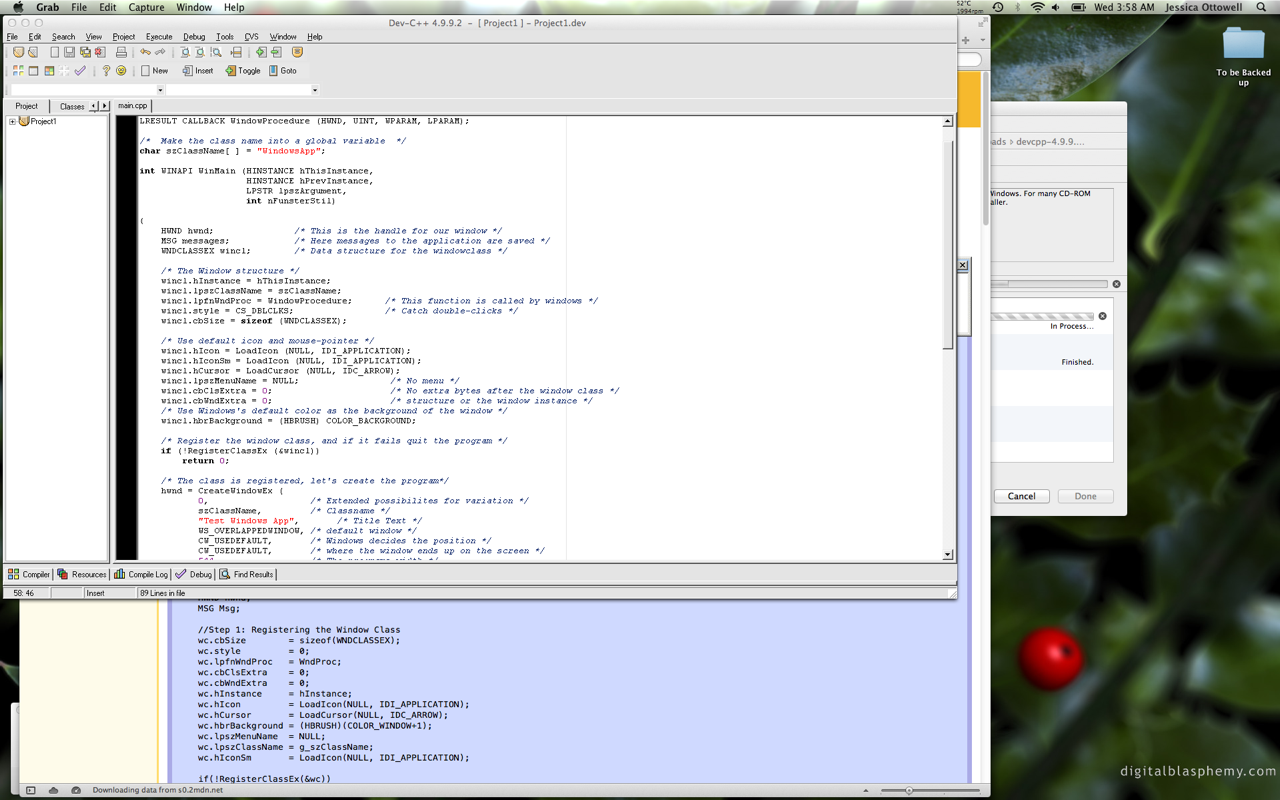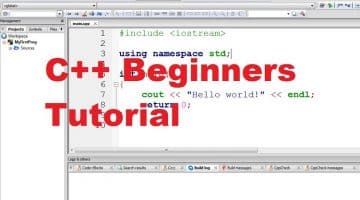Enjoy support for C11, C14 and many C17 features with market leading performance, build throughput and security. Write code using the power of generic lambda expressions, resumable functions, decltype (auto), extended constexpr and C attributes, fold expressions, noexcept in type system, inline variables and other modern features.
Feature list
- Support GCC-based compilers
- Integrated debugging (using GDB)
- Support for multiple languages (localization)
- Class Browser
- Code Completion
- Debug variable Browser
- Project Manager
- Customizable syntax highlighting editor
- Quickly create Windows, console, static libraries and DLLs
- Support of templates for creating your own project types
- Makefile creation
- Edit and compile Resource files
- Tool Manager
- Print support
- Find and replace facilities
- Package manager, for easy installation of add-on libraries
- CVS Support
- To-Do List
- CPU Window
Requirements
Welcome to the Azure C and C Developer Center. Learn how to create your first C/C applications using Microsoft Azure and access C and C tutorials and documentation. Azure Marketplace Find, try and buy Azure building blocks and finished software solutions; Partners. See our Visual Studio Professional, Enterprise, Test Professional, & MSDN Platforms pricing today. Buy Visual Studio. Visual Studio Subscriptions provides access to developer tools, cloud services, software, support, and training. Access to Microsoft software for Dev/Test use (Windows Server, Windows SQL Server, and more. Dev-C is a free full-featured integrated development environment (IDE) distributed under the GNU General Public License for programming in C and C. It is written in Delphi. It is bundled with, and uses, the MinGW or TDM-GCC 64bit port of the GCC as its compiler. Apr 27, 2015 Dev-C is looking for translators, because the author doesn't master all thirty languages Dev-C is (partially) translated in. So, if you're willing to translate Dev-C into a language or update the existing translation, don't hesitate to open up YourLanguage.lng and start translating/updating, using English.lng as the reference language. With the Intel® C Compiler, you can create code that takes advantage of more cores and built-in technologies in platforms based on Intel® processors. Compile and generate applications for Windows., Linux., and macOS. Your applications perform optimally with broad support for. Dev-C is a free full-featured integrated development environment (IDE) distributed under the GNU General Public License for programming in C and C. It is written in Delphi. It is bundled with, and uses, the MinGW or TDM-GCC 64bit port of the GCC as its compiler. Dev-C can also be used in combination with Cygwin or any other GCC-based.
|
License
Dev-C++ is Free Software distributed under the GNU General Public License.
This means you are free to distribute and modify Dev-C++, unlike most Windows software! Be sure the read the license.
Donations
Please support Dev-C++ by making a donation ! The money will be shared between the active developers and the support manager in order to help us continue improving Dev-C++ from day to day.
Click on the button below to make a donation using Paypal or your Credit Card :
Downloads
| Dev-C++ 5.0 beta 9.2 (4.9.9.2) (9.0 MB) with Mingw/GCC 3.4.2 Dev-C++ version 4.9.9.2, includes full Mingw compiler system with GCC 3.4.2 and GDB 5.2.1 See NEWS.txt for changes in this release. Download from: |
| Dev-C++ 5.0 beta 9.2 (4.9.9.2), executable only (2.4 MB) Dev-C++ version 4.9.9.2, without Mingw compiler system and GDB. Get this one if you already have a previous Dev-C++ beta or already a compiler. See NEWS.txt for changes in this release. Download from: |
| Dev-C++ 5.0 beta 9.2 (4.9.9.2), source code (1.6 MB) Dev-C++ version 4.9.9.2 source code for Delphi. Download from: |
Dev C++ For Windows 10
Dev-C++ 4

Yes, Dev-C++ 4 is still available. There are the downloads:
Dev C++ Download For Pc
Binaries:
Source code:

Developers information
Buy Dvc Points
The SourceForge project page is located here. The bleeding edge source code is located at the SourceForge CVS.
- Source code for Dev-C++ 5: CVS repository
In order to compile it, you'll need Borland Delphi 6. - Mingw source code:http://www.mingw.org/
Buy Dev C 2017
- What IDE can I use?
- What compilers are there?
- What <insert> is the best?
Let's start with:
Compilers:
A compiler is a command line application (in most cases) that takes your source code files and generates an executable. The methods used to do this and the resulting size/optimized executable will vary based on compiler.
A compiler does not help you write code, it's not a development environment where you can type code. It's sole purpose is to take code already written and build an executable.
No one compiler is better than any other. They all have their pros and cons. If you wish to compare compilers, please do so from the technical specifications on their own websites. In most cases, this is not going to serve you any great purpose. If optimization is your concern, your best bet is to follow standard coding techniques when developing highly optimized code.
Some common compilers are:
- MS Visual C++ Compiler (Windows) - http://www.microsoft.com/express/vc/
- GCC (Linux) - http://gcc.gnu.org/
- MingW (Windows) - http://www.mingw.org/
- Intel C++ Compiler (Linux, Windows, OS X) - http://www.intel.com/cd/software/products/asmo-na/eng/compilers/284132.htm
- Borland C++ Compiler (Windows) - http://www.borland.com
Integrated Development Environments (IDE)
An IDE is a full suite for software development. Typically they come bundled with a text editor, a compiler and a debugger. The text editors are the main component as they offer functionality like Syntax highlighting, project management, source-control integration etc.
An IDE is not a compiler, but most IDEs will come with one of the compilers listed in the previous section.
e.g Dev-C++ comes with MingW, Code::Blocks comes with GCC.
The complexity of IDEs will vary greatly, while some are better suited for new developers and some for advanced/professional developers.
Note: Dev-C++ is no longer recommended on their official forum. wxDev-C++ should be used instead.
Some common IDEs:
Easy to Use
wxDev-C++ (Windows) - http://wxdsgn.sourceforge.net/
Anjuta (Linux) - http://anjuta.sourceforge.net/
Medium
Code::Blocks (Windows/Linux) - http://www.codeblocks.org/
MS Visual C++ Express (Windows) - http://www.microsoft.com/express/vc/
NetBeans (All) - http://www.netbeans.org/
KDevelop (Linux) - http://www.kdevelop.org/
Borland C++ (Windows) - http://www.borland.com
Difficult
Eclipse CDT (All) - http://www.eclipse.org/
Note: You are also free to write code in any of your favorite text editors then compile it manually.
Debuggers
Debuggers are used to analyze your application while it's running. You are able to pause your application at selected points (breakpoints) and view information such as variable values etc.
Currently, there only seems to be 2 major debuggers in use.
Microsoft Visual Studio Debugger (Windows)
This is a high quality debugger. It's easy to use and integrates seemlessly into the visual studio IDE. It does have some slight problems when dealing with multiple threads, but generally works very well.
GDB (All)
This is an open source debugger often run alongside GCC/MingW. It's also a good quality debugger, but unfortunately it's multi-threaded debugger is considerably behind the visual studio equal.
Fortunately, GDB is platform independent and will integrate with numerous IDEs. Unfortunately, this integration is sometimes very difficult to work with and not intuitive.
Please post corrects/comments or questions below.